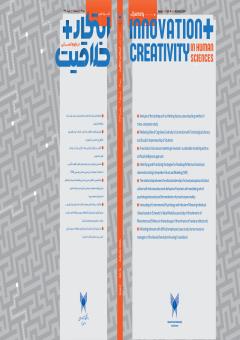رابطه رهبری اخلاقی مدیران مدارس و فرهنگ مدرسه با رفتارهای کاری نوآورانه معلمان با میانجی گری امنیت روانشناختی و تعدیلگری شخصیت پویا
محورهای موضوعی : خلاقیت و نوآوری از جنبه‏های روان‏شناختی، علوم شناختی، علوم تربیتی و آموزشی (خلاقیت شناسی روان‏شناختی، خلاقیت شناسی پرورشی)مهدیه سپهوند 1 * , مرتضی امیدیان 2 , منیجه شهنی ییلاق 3 , غلامحسین مکتبی 4
1 - دانشجوی دکتری روانشناسی تربیتی، دانشکده علوم تربیتی و روانشناسی، دانشگاه شهید چمران اهواز، اهواز، ایران
2 - دانشیار، گروه روانشناسی، دانشکده علوم تربیتی و روانشناسی، دانشگاه شهید چمران اهواز، اهواز، ایران
3 - استاد، گروه روانشناسی، دانشکده علوم تربیتی و روانشناسی ، دانشگاه شهید چمران اهواز، اهواز، ایران
4 - دانشیار، گروه روانشناسی، دانشکده علوم تربیتی و روانشناسی، دانشگاه شهید چمران اهواز، اهواز،
کلید واژه: رفتارهای کاری نوآورانه, سبک رهبری اخلاقی, فرهنگ مدرسه, امنیت روانشناختی, شخصیت پویا,
چکیده مقاله :
هدف: هدف از انجام این پژوهش بررسی رابطه علی رهبری اخلاقی مدیران مدارس و فرهنگ مدرسه با رفتارهای کاری نوآورانه با نقش میانجی امنیت روانشناختی و تعدیلگری شخصیت پویا در معلمان دوره ابتدایی شهرستان خرم آباد بود. روش: این پژوهش از نظر هدف، کاربردی و از نظر روش، از نوع توصیفی - همبستگی بود. جامعهی آماری پژوهش شامل کلیه معلمین شاغل دوره ابتدایی در آموزش و پرورش نواحی یک و دو شهرستان خرم آباد در سال تحصیلی 1403-1402 بود. در این پژوهش حجم نمونه با توجه به پارامتر های آزاد 300 نفر برآورد گردید، که بر اساس روش نمونهگیری تصادفی چند مرحله ای انتخاب شدند. به منظور گردآوری دادهها از پرسشنامه استاندارد استفاده شد. برای تجزیه و تحلیل دادهها افزون بر شاخصهای توصیفی، از نرمافزار SPSS نسخه 21 و تحلیل معادلات ساختاری در نرم افزار Amosبهره گرفته شد. یافته ها: یافته های پژوهش نشان داد که رابطه بین سبک رهبری اخلاقی مدیران با رفتارهای کاری نوآورانه معلمان، رابطه بین فرهنگ مدرسه و رفتارهای کاری نوآورانه معلمان، رابطه بین رهبری اخلاقی مدیران و امنیت روانشناختی معلمان، رابطه بین فرهنگ مدرسه و امنیت روانشناختی معلمان و رابطه بین امنیت روانشناختی و رفتارهای کاری نوآورانه معلمان مثبت و معنادار می باشد. همچنین رابطه بین سبک رهبری اخلاقی مدیران و رفتارهای کاری نوآورانه معلمان با میانجی گری امنیت روانشناختی و رابطه بین فرهنگ مدرسه و رفتارهای کاری نوآورانه معلمان با میانجی گری امنیت روانشناختی نیز مثبت و معنادار می باشد. همچنین شخصیت پویا در رابطه بین سبک رهبری اخلاقی مدیران و رفتارهای کاری نوآورانه معلمان و رابطه بین فرهنگ مدرسه و رفتارهای کاری نوآورانه معلمان نقش تعدیلگر را ایفا می کند. نتیجه گیری: بکارگیری سبک مناسب رهبری همچون رهبری اخلاقی و ایجاد قرهنگ قوی در مدارس باعث می شود تا کارکنان تصورات مشترکی در خصوص امنیت روانی در محیط کار پیدا کنند و با تکیه بر این جو مثبت و سازنده ای که در سازمان وجود دارد بدون ترس از اشتباهات احتمالی عقاید و نظرات خود را بیان کنند.
Objective: The purpose of this research was to investigate the causal relationship between the ethical leadership of school principals and school culture with innovative work behaviors with the mediating role of psychological security and moderating proactive personality in elementary school teachers of Khorram Abad city. Research method: This research was applied in terms of purpose and descriptive-correlation in terms of method. The statistical population of the research included all the teachers working in primary education in districts one and two of Khorramabad city in the academic year of 1402-1403. In this research, the sample size was estimated to be 300 people according to the free parameters, who were selected based on the multi-stage random sampling method. In order to collect data, a standard questionnaire was used. In addition to descriptive indices, SPSS version 21 software and structural equation analysis in Amos software were used for data analysis. Findings: Findings show that the relationship between the ethical leadership style of managers and innovative work behaviors of teachers, the relationship between school culture and innovative work behaviors of teachers, the relationship between ethical leadership of managers and psychological security of teachers, the relationship between school culture and psychological security of teachers and the relationship between psychological security and innovative work behaviors of teachers are positive and meaningful. Also, the relationship between the ethical leadership style of managers and the innovative work behaviors of teachers with the mediation of psychological security and the relationship between school culture and the innovative work behaviors of teachers with the mediation of psychological security is also positive and significant. Also, proactive personality plays a moderating role in the relationship between ethical leadership style of managers and innovative work behaviors of teachers and the relationship between school culture and innovative work behaviors of teachers. Conclusion: Using the appropriate leadership style, such as ethical leadership and creating strong morale in schools, makes employees find common ideas about psychological safety in the workplace, and relying on this positive and constructive atmosphere in the organization without fear of possible mistakes of ideas and express their opinions.

